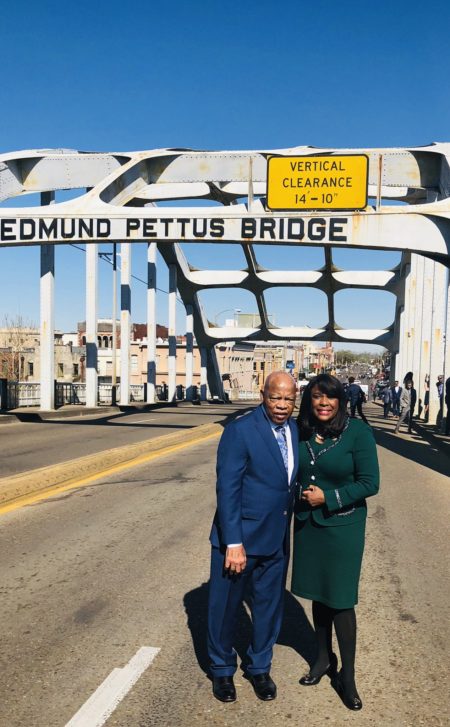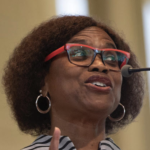
Civil rights icon and US Congressman John Lewis, who died of pancreatic cancer last week, spent his life and career advocating for equal access to the ballot for all Americans. Lewis nearly lost his own life on Bloody Sunday, March 7, 1965, when he attempted to lead a nonviolent voting-rights march from Selma to Montgomery. He was beaten at the foot of the Edmund Pettus Bridge, resulting in a fractured skull.
To honor the life and legacy of Lewis, Democratic lawmakers want the 2019 Voting Rights Advancement Act he fought for passed, and are renaming it the John R. Lewis Voting Rights Act of 2020. The bill would reverse the damage done by the 2013 Shelby County v. Holder decision that invalidated a key section of the Voting Rights Act of 1965.
Since the 1965 Civil Rights Voting Act gave African Americans the ballot, the GOP has made multiple ongoing attempts to suppress minority voting. Including interpolations of old Jim Crow maneuvers like literacy tests, poll taxes, and grandfather clauses that have given way to new tactics like random voter-roll purging, changing poll locations and hours, eliminating early voting days, reducing the number of polling places, packing majority-minority districts, dividing minority districts, and backing notorious voter ID laws that disproportionately disenfranchise minority voters. They are all part and parcel of the Republican playbook.
In one example of how things can go wrong, in 2000, the outcome of the presidential race between Democratic Vice President Al Gore and Republican Texas Gov. George W. Bush was decided in a recount of Florida ballots. In predominantly Black voting precincts, which are overwhelmingly Democratic, piles of ballots were left uncounted. The US Civil Rights Commission reported that of ballots invalidated by Florida officials, 53% were cast by Black voters. Meanwhile, the Florida vote was settled in Bush’s favor, winning him the presidency. His brother Jeb was governor at the time.
In 2013, by a five-to-four Republican majority, the US Supreme Court case Shelby County v. Holder eviscerated Section 4 of the 1965 Voting Rights Act. Section 4 identified problematic voting precincts with shameful histories of racial discrimination—not surprisingly, these precincts are predominately GOP strongholds. Nevertheless, the SCOTUS ruled that Section 4, which historically protected African Americans and other disenfranchised people of color, was outdated, all on the fictive post-racial premise that racial minorities, especially in the South, no longer confront discriminatory barriers from voting because Obama was president. At the time, the 1965 VRA applied to nine states in South—Alabama, Alaska, Arizona, Georgia, Louisiana, Mississippi, South Carolina, Texas, and Virginia.
While many people may think that voter suppression only happens in the South, scores of counties and municipalities in the North—including New York City, and even my home borough of Brooklyn—were covered in the 1965 VRA as well. Following Shelby County v. Holder, though, places like North Carolina, where the Black vote increased since the election of Barack Obama in 2008, were especially targeted.
In 2018, the epic gubernatorial battle between Democratic candidate Stacey Abrams and Republican candidate Brian Kemp in Georgia was a brazen example of how GOP power grabs work. Kemp, while running for governor, was Georgia’s secretary of state, and in that position oversaw elections. Kemp was also responsible for the state’s “exact match” policy, which, according to the Associated Press, resulted in 53,000 applications being put on hold, of which 70% belonged to Black voters.
Nationally, last year US Senate Majority Leader Mitch McConnell voiced opposition to making Election Day a federal holiday. But allowing American voters a more relaxed and stress-free trip to their voting precincts should be a no-brainer. A proposed measure called the For the People Act of 2019, which McConnell has mocked as the “Democrat Politician Protection Act,” would do just that by “expand[ing] Americans’ access to the ballot box, reduc[ing] the influence of big money in politics, and strengthen[ing] ethics rules for public servants, and other purposes.” The bill would also improve access for voters with disabilities and reform automatic voter registration and felon re-enfranchisement. In other words, it would modernize a century-old bankrupt voting system to mirror America today, thus allowing for a true participatory democracy.
Lewis said, “Never, ever be afraid to make some noise and get in good trouble, necessary trouble.” To honor the congressman, let’s make some good trouble this November, and vote out our present Republican thugocracy.
As voters, we don’t have to capitulate to the powers that be, because the power of the people is greater than the people in power.
Rev. Irene Monroe can be heard on the podcast and standing Boston Public Radio segment ALL REV’D UP on WGBH (89.7 FM). Monroe’s syndicated religion columns appear and the Boston voice for Detour’s African American Heritage Trail. She is a s a Visiting Researcher in the Religion and Conflict Transformation Program at Boston University School of Theology.

